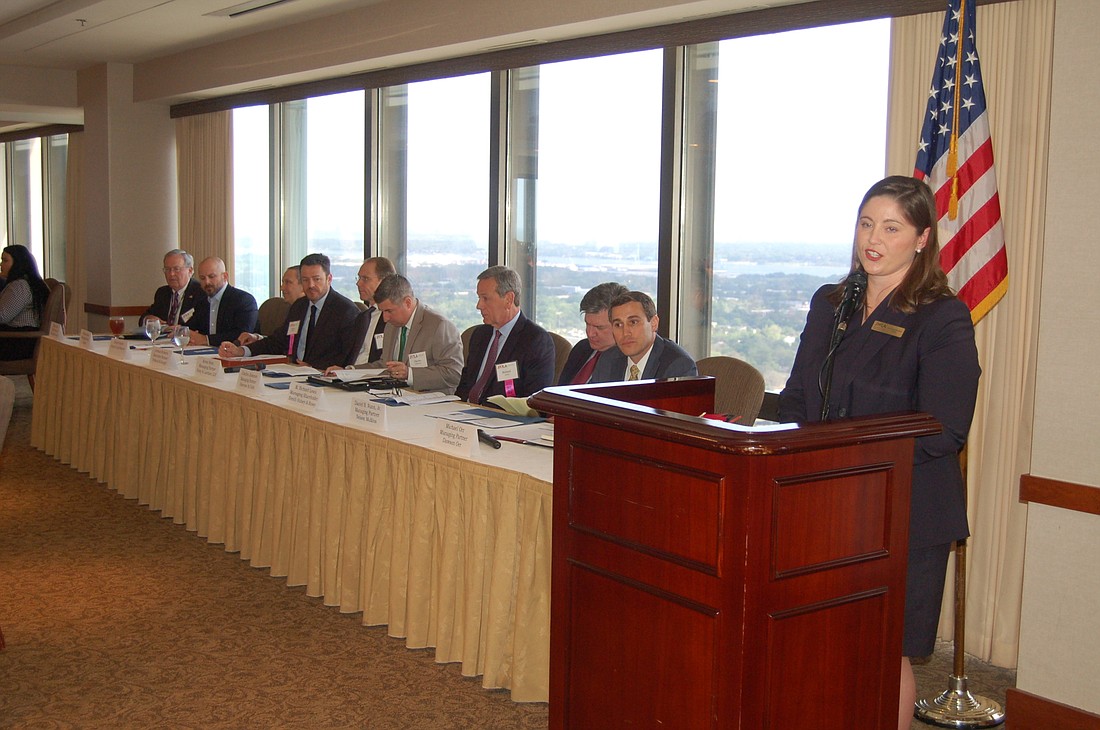
Tuesday was the national observance of “Equal Pay Day,” representing how far into the new year the average woman must work to earn the same amount of pay the average man earned the previous year.
On Thursday, the Jacksonville Women Lawyers Association presented a panel discussion on the topic of gender bias and the means to equality in the legal profession.
“We recognize that our profession has a long way to go,” said Jennifer Shoaf Richardson, attorney at Jackson Lewis and JWLA president.
The panelists were managing and senior partners of some of Jacksonville’s largest law firms: Bill Adams from Gunster; 4th Judicial Circuit Public Defender Charlie Cofer; Robert Harris of Harris Guidi; Kevin Hyde from Foley & Lardner; Charles Jimerson of Jimerson & Cobb; Richard Lewis from Smith Hulsey & Busey; Daniel Nunn from Nelson Mullins; Michael Orr of Dawson Orr; and Joshua Roberts from Holland & Knight.
“Let’s acknowledge the obvious here,” Richardson said after she introduced the all-male, all-white panel.
“I hope we reconvene this panel in 10 years and it looks different,” she added.
Orr, who recently was elected to The Florida Bar board of governors, said that more women than men are enrolled in nine of the 12 law schools in the state, making gender equality in the profession a growing issue as more women will be joining law firms in the coming years.
“We’re happy to generate discussion,” he said.
When evaluating legal talent when expanding a firm, Hyde said Foley & Lardner is taking the proactive approach.
Prioritizing gender equality “is as important as substantive expertise,” he said.
Adams said when clients are considering whether to retain Gunster, the firm’s performance in terms of gender equality has been a factor for larger companies for nearly 20 years, and it now is across-the-board.
“It’s an advantage to have a legal team that aligns with a client’s workforce,” Adams said. “It’s increasingly uncomfortable for people to see a room full of white guys working on a task.”
While some law firms have adopted a policy to screen candidates “blind,” meaning without any reference to race or gender during the evaluation process, Harris said that’s not how his firm approaches recruiting.
“We look for female candidates,” he said, because women generally are “more organized and more team players.”
Roberts said Holland & Knight makes sure cases are staffed with diverse teams.
“We want to ensure that female associates are involved in cases at the highest level,” he said.
The association’s intent when the panel was assembled was to “spur real conversation about what we can do about gender bias,” Richardson said.
She pointed out that nationwide, only 19 percent of equity partners are women.
“And it’s likely worse in Jacksonville,” Richardson said.
“Hopefully, this can be the beginning of change in Jacksonville,” Roberts said.
“Part of solving the problem is recognizing it.”